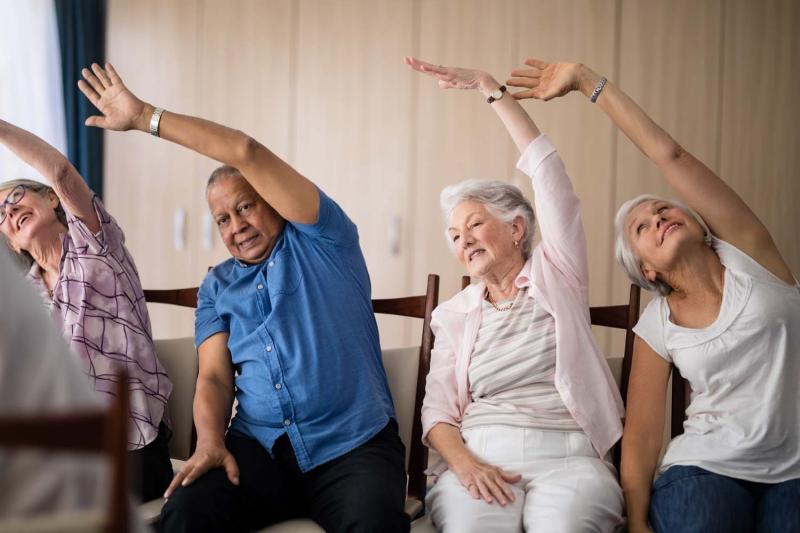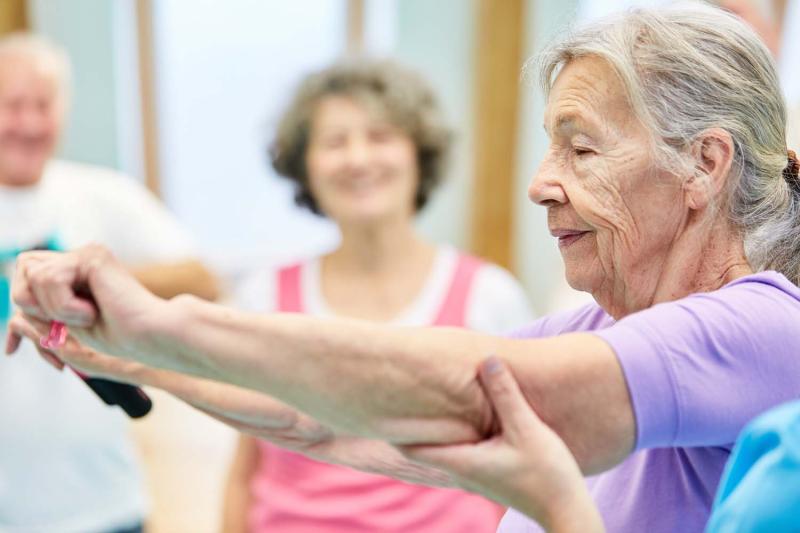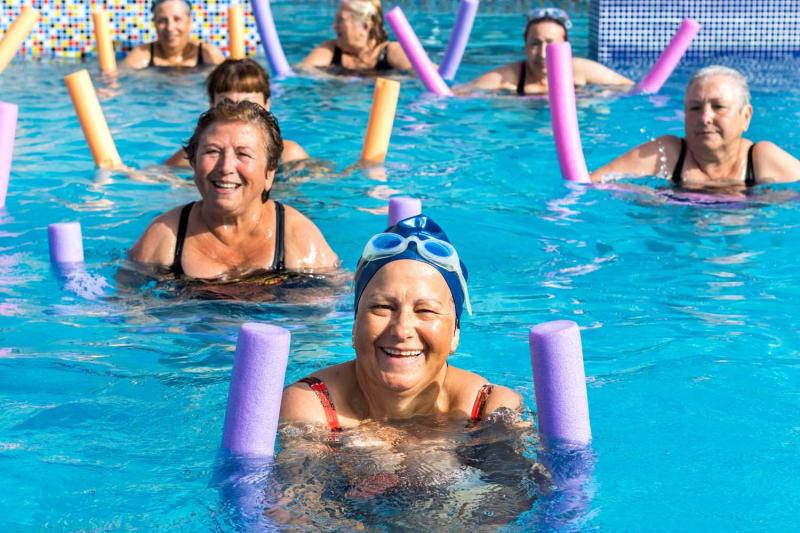Key points
- Exercise and physical activity are thought to improve or maintain mobility and physical function in people living with dementia.
- Evidence from 20 systematic reviews showed that exercise and physical activity improved apathy, agitation, health-related quality of life, mobility, and physical fitness.
- The evidence of the benefit of exercise and physical activity for outcomes such as mood, responsive behaviours, functional ability, depression, and cognitive functioning is inconclusive.
- Studies that assessed the relationship between exercise and outcomes such as sleep disturbances, mortality, and the occurrence of delusions and hallucinations found no benefit.
Exercise and physical activity are thought to improve or maintain mobility and physical function in people living with dementia. Common types of exercise programs for people living with dementia include:
- Endurance or aerobic exercise (e.g., brisk walking or cycling on a stationary cycle)
- Exercise that involves coordination of the body, such as dance-like movements
- Resistance-based exercises designed to improve strength and endurance.
This evidence theme on exercise and physical activity is a summary of one of the key topics identified by a scoping review of dementia research. If you need more information on this topic, try using the PubMed search below.
We found 20 systematic reviews examining the relationship between exercise and outcomes for people living with dementia. Many studies report benefits of exercise and physical activity.
These include improvements in:
- Apathy [1]
- Agitation [1, 2]
- Health-related quality of life [3]
- Mobility [2, 4]
- Ability to manage self-care [5]
- Physical fitness. [3]
Some studies also report a reduction in falls. [3, 6-8]
The evidence of the effectiveness of exercise and physical activity is inconclusive for:
- Improving mood [2, 9]
- Reducing responsive behaviours [1, 3, 5, 10]
- Increasing functional ability [2, 4, 9, 11-14]
- Reducing depression [9, 10, 12]
- Improving cognitive functioning. [2, 3, 5, 9, 12, 13, 15-19]
This is because some studies found exercise and physical activity improved these outcomes, while other studies reported no or little improvement in them.
There was no clear evidence of benefit for:
- The occurrence of delusions and hallucinations [12]
- Sleep disturbances [12]
- Mortality rate [10]
- Quality of care. [20]
In other words, studies found no association between exercise and these outcomes.
Overall, exercise programs appear most likely to be effective when they:
- Involve an aerobic or resistance-based component or both. [13, 15, 18]
- Are less intensive (i.e., run for 30 minutes or less, three or fewer times per week). [16]
- Run for 12 weeks or longer. [17]
- Encourage people who are often sedentary to become more active. [17]
The reviews also highlighted concerns about the methods used in some of the studies. This reduces the degree of certainty we might have about the benefits of exercise and physical activity. For example:
- Studies often did not compare the effectiveness of exercise and physical activity across different stages of dementia. [7, 12, 19]
- Studies were not always clear about the type, frequency, intensity, and duration of the exercise involved. [3, 9, 13, 16]
- Some studies only had a small number of participants. [2, 6, 11, 20]
- It is unclear how long benefits last. [6, 17, 20]
- Potentially important outcomes were not assessed (e.g., sleep quality and cost-effectiveness). [2, 4, 11]
- Be familiar with the potential benefits of exercise and physical activity for people living with dementia (see some resources below).
- Report any concerns you may have to your line manager (e.g., drastic weight change, falls risk, inability to manage self-care).
- Consider referring people with dementia to a physiotherapist or an occupational therapist to optimise their ability to carry out day-to-day activities and to improve their quality of life.
- Put practices in place (e.g., staff training, organisational changes) to support people’s adherence to exercise programs which may have been provided by a physiotherapist, exercise physiologist, or occupational therapist.
- Wang G, Albayrak A, van der Cammen TJM. A systematic review of non-pharmacological interventions for BPSD in nursing home residents with dementia: From a perspective of ergonomics. Int Psychogeriatr. 2019;31(8):1137-49.
- Brett L, Traynor V, Stapley P. Effects of physical exercise on health and well-being of individuals living with a dementia in nursing homes: A systematic review. J Am Med Dir Assoc. 2016;17(2):104-16.
- de Almeida SIL, Gomes da Silva M, Marques ASPD. Home-based physical activity programs for people with dementia: Systematic review and meta-analysis. Gerontologist. 2020;60(8):e600-e8.
- Littbrand H, Stenvall M, Rosendahl E. Applicability and effects of physical exercise on physical and cognitive functions and activities of daily living among people with dementia: A systematic review. Am J Phys Med Rehabil. 2011;90(6):495-518.
- Sampath P, Forbes DA, Barton S, Blake C. A systematic review of the effectiveness of interventions for persons living with dementia based in the home or community. Perspectives. 2015;38(2):6-19.
- Burton E, Cavalheri V, Adams R, Browne CO, Bovery-Spencer P, Fenton AM, et al. Effectiveness of exercise programs to reduce falls in older people with dementia living in the community: A systematic review and meta-analysis. Clin Interv Aging. 2015;10:421-34.
- Chan WC, Fai Yeung JW, Man Wong CS, Wa Lam LC, Chung KF, Hay Luk JK, et al. Efficacy of physical exercise in preventing falls in older adults with cognitive impairment: A systematic review and meta-analysis. J Am Med Dir Assoc. 2015;16(2):149-54.
- Gulka HJ, Patel V, Arora T, McArthur C, Iaboni A. Efficacy and generalizability of falls prevention interventions in nursing homes: A systematic review and meta-analysis. J Am Med Dir Assoc. 2020;21(8):1024-35.e4.
- Li X, Guo R, Wei Z, Jia J, Wei C. Effectiveness of exercise programs on patients with dementia: A systematic review and meta-analysis of randomized controlled trials. Biomed Res Int. 2019;2019:2308475.
- Barreto Pde S, Demougeot L, Pillard F, Lapeyre-Mestre M, Rolland Y. Exercise training for managing behavioral and psychological symptoms in people with dementia: A systematic review and meta-analysis. Ageing Res Rev. 2015;24(Pt B):274-85.
- Brown SR, Yoward L. The effectiveness of home-based exercise programmes on mobility and functional independence in community-dwelling adults with Alzheimer's disease: A critical review. Int J Ther Rehabil. 2019;26(10):1-14.
- Forbes D, Forbes S, Morgan DG, Markle-Reid M, Wood J, Culum I, et al. Exercise programs for people with dementia. Cochrane Database Syst Rev. 2015(4).
- Groot C, Hooghiemstra AM, Raijmakers PG, van Berckel BN, Scheltens P, Scherder EJ, et al. The effect of physical activity on cognitive function in patients with dementia: A meta-analysis of randomized control trials. Ageing Res Rev. 2016;25:13-23.
- McLaren AN, Lamantia MA, Callahan CM. Systematic review of non-pharmacologic interventions to delay functional decline in community-dwelling patients with dementia. Aging Ment Health. 2013;17(6):655-66.
- Huang X, Zhao X, Li B, Cai Y, Zhang S, Wan Q, et al. Comparative efficacy of different exercise interventions on cognitive function in patients with MCI or dementia: A systematic review and network meta-analysis. J Sport Health Sci. 2021.
- Jia RX, Liang JH, Xu Y, Wang YQ. Effects of physical activity and exercise on the cognitive function of patients with Alzheimer disease: A meta-analysis. BMC Geriatr. 2019;19(1):181.
- Learner NA, Williams JM. Can physical activity be used to maintain cognitive function in nursing home residents with dementia? A literature review. Phys Ther Rev. 2016;21(3-6):184-91.
- Ohman H, Savikko N, Strandberg TE, Pitkala KH. Effect of physical exercise on cognitive performance in older adults with mild cognitive impairment or dementia: A systematic review. Dement Geriatr Cogn Disord. 2014;38:347-65.
- Wayne PM, Walsh JN, Taylor-Piliae RE, Wells RE, Papp KV, Donovan NJ, et al. Effect of Tai Chi on cognitive performance in older adults: Systematic review and meta-analysis. Journal of the J Am Geriatr Soc. 2014;62(1):25-39.
- Cabrera E, Sutcliffe C, Verbeek H, Saks K, Soto-Martin M, Meyer G, et al. Non-pharmacological interventions as a best practice strategy in people with dementia living in nursing homes. A systematic review. Eur Geriatr Med. 2015;6(2):134-50.
Connect to PubMed evidence
This PubMed topic search is limited to home care and residential aged care settings. You can choose to view all citations or citations to articles available free of charge.


